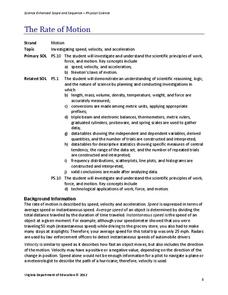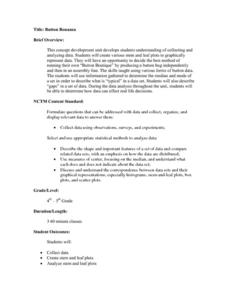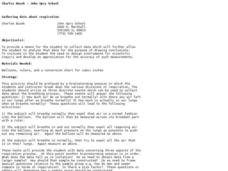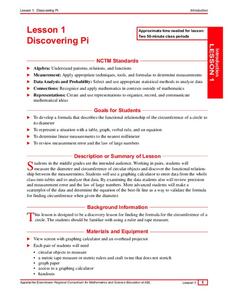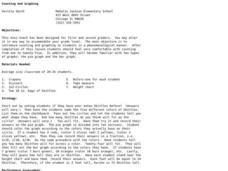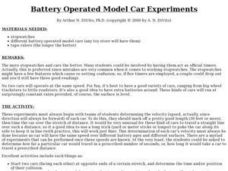Virginia Department of Education
The Rate of Motion
How much time does it take to jump over three balloons? Pupils calculate the speed of tasks that require different motions. They determine motions for tasks such as walking, skipping, hopping, and jumping before creating a...
NASA
Cleaning Water
Give young scientists a new appreciation of fresh, clean drinking water. After learning about the ways astronauts recycle their air and water, your class will work in small groups creating and testing their very own water...
NASA
Cleaning Water
From their sweat to the water vapor in their breath, astronauts recycle every possible drop of water while in space. After watching a short video describing the different ways materials are recycled and reused in space...
Curated OER
Button Bonanza
Collections of data represented in stem and leaf plots are organized by young statisticians as they embark some math engaging activities.
NOAA
Wet Maps
How do oceanographers make maps under water? Junior explorers discover the technologies and processes involved in creating bathymetric maps in part three of a five-part series designed for fifth- and sixth-grade pupils. The...
NOAA
Through Robot Eyes
How do robots assist ocean explorers in collecting data and images? The final installment in a five-part series has science scholars examine underwater images collected by robots and identify the organisms shown. Groups then calculate...
EngageNY
The Distance from a Point to a Line
What is the fastest way to get from point A to line l? A straight perpendicular line! Learners use what they have learned in the previous lessons in this series and develop a formula for finding the shortest distance from...
Curated OER
Learning the Letters
Students identify the letters of the alphabet. In this letters lesson, students use an iPad to play games, draw pictures, and listen to videos about the alphabet. They use pipe cleaners to create their name.
Curated OER
Math is Everywhere: Part 2
Second graders identify shapes and measurements in everyday life. In this measurement lesson, 2nd graders locate rectangles in their classroom and use standard and nonstandard forms to measure them. Students view a video clip...
Curated OER
Gathering Data About Respiration
Students engage in an experiment that tests how much air we breathe in and out during the respiration process. In this respiration lesson, students blow a typical breath's amount of air into a balloon. They use a ruler to measure the...
Curated OER
Perimeter
Learners use their hands, feet, computer, and rulers to measure the perimeter of objects. For this measurement lesson plan, students measure objects around the room and computer generated shapes.
Curated OER
Discovering Pi
Students develop a formula that describes the functional relationship of the circumference of a circle to its diameter. Working with a partner, they measure the diameter and circumference of circular objects in order to discover the...
Curated OER
Prey or Pray? Could YOU Escape a Cheetah?
Tenth graders estimate the size of an adult cheetah by research and measurement of a picture. They determine the approximate distance and speed of the cheetah from a filmed chase and compare that to their own running speed.
Curated OER
Counting And Graphing
Students explore counting and graphing. In this math lesson plan, students practice counting from 1-25 and are exposed to two types of graphs: the pie graph and the bar graph. Students use Skittles to represent a variety of measurements.
Curated OER
Any Nook or Cranny
Students create a reading nook. In this measurement lesson, students find a spot in the classroom to turn into a reading nook. They need to measure how much space they need to fit students and supplies into their nook.
Curated OER
6-8 Interior Design: Designing My Dream Room
Students analyze interior design as a profession. For this interior design lesson, students design their own dream bedroom and explore interior design as a profession. Students draw a scaled drawing using graph paper and appropriate...
Curated OER
Weather
Second graders study the basic components of weather. They construct a thermometer and anemometer to measure temperatures, precipitation, and wind speed. In addition, 2nd graders discover how to find these components on weather maps.
Curated OER
Art and the Golden Ration
Students manipulate several metric measuring devices to become competent in their use. Students work cooperatively to complete a worksheet based on the Golden Ration. Students observe example of sculptures from different cultures and...
Curated OER
Coordinate Grid: Mapping Archeological Sites
Fourth graders discover how to apply the Cartesian coordinate system by figuring out the length and width of their school playground. They determine that pacing is an important tool for the initial mapping of a site. Students conduct a...
Curated OER
Whose Skeleton is in Your Closet?
Students analyze and measure parts of a model skeleton to determine sex, race, height and age. They produce a lab report from their inquiries.
Curated OER
How to Figure Board Feet and Cost of a Board
Students investigate woodworking and converting lengths to cubic measurements. In this math conversions instructional activity, students examine the length of a piece of board, and its total area by using the formula for finding...
Curated OER
Create your own thermometer
Students participate in an activity where they build a calibrated thermometer. In this thermometer lesson students complete this activity and take notes.
Curated OER
Design an Apartment
Students are given the task of designing an apartment. In groups, they practice estimating the area and perimeter of different shapes. After designing their space, they apply the same formulas to solving real-world story problems.
Curated OER
Battery Operated Model Car Experiments
Students time battery operated cars over a set track and determine the velocity of each type of car. They use the cars as manipulatives to demonstrate word problems involving velocity.
